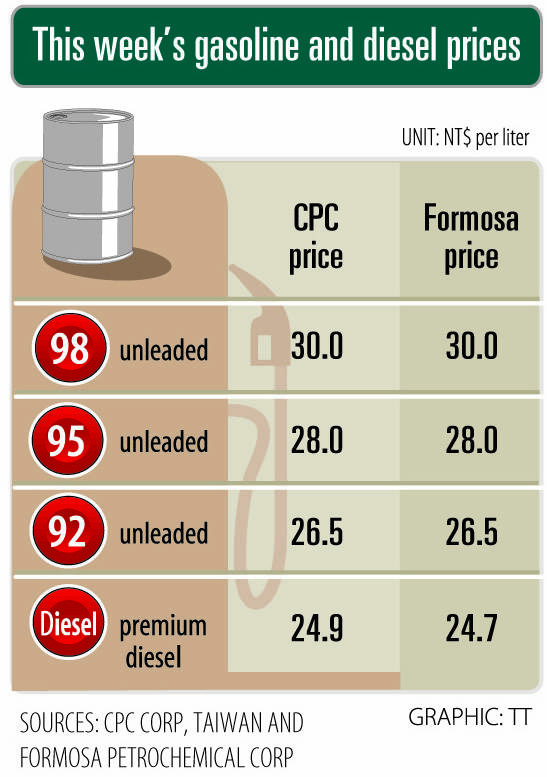Gasoline and diesel prices are to fall NT$0.5 and NT$0.8 per liter respectively this week, CPC Corp, Taiwan (台灣中油) and Formosa Petrochemical Corp (台塑石化) said yesterday, as global crude oil prices last week dropped for the third consecutive week.
Gasoline prices at CPC and Formosa stations are to fall to NT$26.5, NT$28 and NT$30 per liter for 92, 95 and 98-octane unleaded gasoline respectively, the companies said in separate statements.
Premium diesel is to cost NT$24.9 per liter at CPC stations and NT$24.7 at Formosa pumps, they added.

Following the latest adjustments, domestic gasoline and diesel prices have hit the lowest levels in three months after international crude oil prices continue to slide.
The companies said the market expected another sizeable supply increase from OPEC+ nations next month and a soft demand outlook to create a supply glut, keeping downward pressure on oil prices.
Additionally, a US Energy Information Administration report showed that US commercial crude oil stockpiles increased by a larger-than-expected 3.5 million barrels in the week ended on Oct. 10, which further weighed on market sentiment, the companies said.
Front-month Brent crude oil futures — the international oil benchmark — last week fell 2.3 percent to settle at US$61.29 per barrel on the Intercontinental Exchange, while West Texas Intermediate crude oil futures — the US oil gauge — declined 2.31 percent to close at US$57.54 per barrel on the New York Mercantile Exchange.

RECYCLE: Taiwan would aid manufacturers in refining rare earths from discarded appliances, which would fit the nation’s circular economy goals, minister Kung said Taiwan would work with the US and Japan on a proposed cooperation initiative in response to Beijing’s newly announced rare earth export curbs, Minister of Economic Affairs Kung Ming-hsin (龔明鑫) said yesterday. China last week announced new restrictions requiring companies to obtain export licenses if their products contain more than 0.1 percent of Chinese-origin rare earths by value. US Secretary of the Treasury Scott Bessent on Wednesday responded by saying that Beijing was “unreliable” in its rare earths exports, adding that the US would “neither be commanded, nor controlled” by China, several media outlets reported. Japanese Minister of Finance Katsunobu Kato yesterday also

China Airlines Ltd (CAL, 中華航空) said it expects peak season effects in the fourth quarter to continue to boost demand for passenger flights and cargo services, after reporting its second-highest-ever September sales on Monday. The carrier said it posted NT$15.88 billion (US$517 million) in consolidated sales last month, trailing only September last year’s NT$16.01 billion. Last month, CAL generated NT$8.77 billion from its passenger flights and NT$5.37 billion from cargo services, it said. In the first nine months of this year, the carrier posted NT$154.93 billion in cumulative sales, up 2.62 percent from a year earlier, marking the second-highest level for the January-September

‘DRAMATIC AND POSITIVE’: AI growth would be better than it previously forecast and would stay robust even if the Chinese market became inaccessible for customers, it said Taiwan Semiconductor Manufacturing Co (TSMC, 台積電) yesterday raised its full-year revenue growth outlook after posting record profit for last quarter, despite growing market concern about an artificial intelligence (AI) bubble. The company said it expects revenue to expand about 35 percent year-on-year, driven mainly by faster-than-expected demand for leading-edge chips for AI applications. The world’s biggest contract chipmaker in July projected that revenue this year would expand about 30 percent in US dollar terms. The company also slightly hiked its capital expenditure for this year to US$40 billion to US$42 billion, compared with US$38 billion to US$42 billion it set previously. “AI demand actually

Jensen Huang (黃仁勳), founder and CEO of US-based artificial intelligence chip designer Nvidia Corp and Taiwan Semiconductor Manufacturing Co (TSMC, 台積電) on Friday celebrated the first Nvidia Blackwell wafer produced on US soil. Huang visited TSMC’s advanced wafer fab in the US state of Arizona and joined the Taiwanese chipmaker’s executives to witness the efforts to “build the infrastructure that powers the world’s AI factories, right here in America,” Nvidia said in a statement. At the event, Huang joined Y.L. Wang (王英郎), vice president of operations at TSMC, in signing their names on the Blackwell wafer to